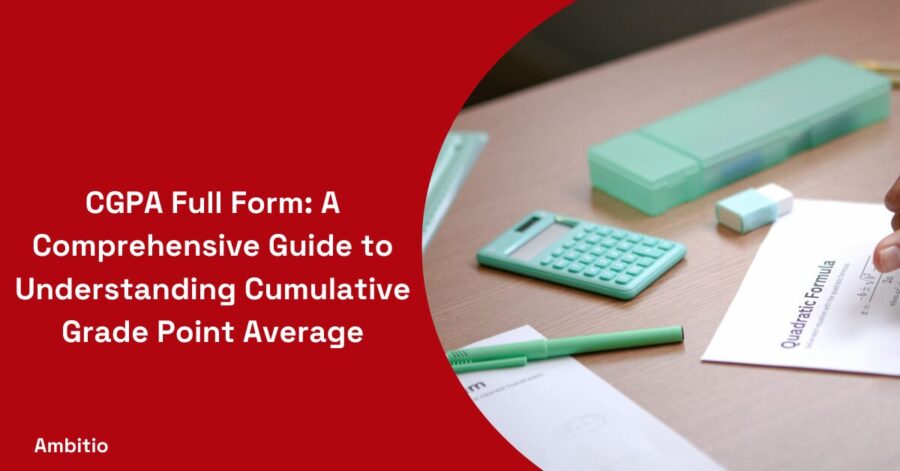13 December 2024
5 minutes read
CGPA Full Form: A Comprehensive Guide to Understanding Cumulative Grade Point Average

Introduction
In the realm of academic assessment, the acronym ‘CGPA’ is frequently mentioned. The CGPA full form, standing for Cumulative Grade Point Average, is a key metric in educational systems worldwide. This article aims to explore the intricacies of CGPA, its calculation methodology, and its significance in the academic landscape.
CGPA Full Form and Its Crucial Role in Academic Evaluation
Demystifying CGPA Full Form and Its Components
The full form of CGPA, Cumulative Grade Point Average, is a grading system widely utilized in educational institutions to evaluate a student’s overall academic performance.
It aggregates the grade points a student earns across various subjects or courses, offering a comprehensive overview of their academic prowess. Unlike the GPA (Grade Point Average), which typically assesses performance over a single term or semester, CGPA encompasses a broader academic duration, often an entire degree program.
Understanding Grade Points and Credit Hours
In the CGPA system, each course is assigned a specific number of credit hours, reflecting its academic weight. The grade points a student earns in each course are then multiplied by these credit hours. The product of these multiplications across all courses gives the total grade points, which when divided by the total credit hours, results in the CGPA.
The Methodology Behind CGPA Calculation
Calculating CGPA is a straightforward yet critical process in academic evaluation. It involves accumulating the grade points earned in each subject, factoring in the respective credit hours, and averaging these totals over the entire academic period.
Step-by-Step Breakdown of CGPA Calculation
- Understand the Grading Scale: Begin by familiarizing yourself with the grading scale of your educational institution. Different institutions may use different scales (like 4.0, 7.0, 10.0, etc.), where each letter grade corresponds to a numeric value (grade point).
- Gather Your Grades: Collect the grades you have received in each course over the entire duration of your academic program.
- Convert Grades to Grade Points: Convert each grade to its corresponding grade point using your institution’s grading scale. For example, on a 10-point scale, an ‘A’ might be equivalent to 9.0.
- Know the Credit Hours: Identify the credit hours or units for each course. Credit hours usually depend on the number of hours spent in a class per week.
- Multiply Grade Points with Credit Hours: For each course, multiply the grade point by the course’s credit hours. This gives you the total points for that course.
- Sum the Total Points: Add up all the total points from each course.
- Sum the Total Credit Hours: Add up all the credit hours for all the courses.
- Divide to Find CGPA: Divide the sum of the total points by the sum of the total credit hours. This quotient is your CGPA.
- Round Off (if necessary): Some institutions may require you to round off the CGPA to a certain number of decimal places.
- Understand Your CGPA: Interpret your CGPA according to the grading standards of your institution. A higher CGPA typically indicates better academic performance.
CGPA and Its Impact on Academic and Career Prospects
CGPA is more than just a number; it significantly impacts a student’s academic trajectory and future career opportunities. Higher education institutions and employers often look at a student’s CGPA as a measure of their academic diligence, understanding, and capabilities.
CGPA as a Criterion for Higher Education and Employment
For students aspiring for higher education, particularly in competitive fields, a high CGPA can be a ticket to prestigious universities and courses. Similarly, in the job market, many employers consider a candidate’s CGPA as a factor in hiring decisions, viewing it as indicative of the candidate’s ability to grasp and apply complex concepts.
The Comparative Analysis of GPA and CGPA
While both GPA and CGPA are pivotal in academic assessment, understanding their differences is crucial. GPA is confined to a single term or semester, whereas CGPA spans the entire duration of a program.
GPA vs. CGPA: Detailed Examination
| Criteria | GPA (Grade Point Average) | CGPA (Cumulative Grade Point Average) |
|---|---|---|
| Definition | A measure of a student’s academic performance for a single term or semester. | A comprehensive measure of a student’s overall academic performance throughout their entire course or program. |
| Scope | Limited to one semester or term. | Encompasses all semesters/terms of a student’s academic program. |
| Purpose | Provides a snapshot of a student’s academic abilities and understanding during a specific period. | Offers a holistic view of a student’s consistent performance and learning curve over the entire duration of their study. |
| Calculation | Calculated by averaging the grade points earned in each course during a specific semester or term. | Calculated by averaging the grade points across all courses taken during the entire academic program. |
| Frequency | Calculated at the end of each semester or term. | Typically calculated at the end of an academic program, though interim CGPAs can be computed at the end of each year. |
| Impact | Used for assessing semester-wise progress, determining eligibility for certain courses, or academic honors for a term. | Used for assessing overall academic excellence, eligibility for graduation honors, and often considered for higher education admissions or job applications. |
| Flexibility | Less flexible, as it only reflects a short period and can vary significantly from term to term. | More flexible in terms of reflecting a student’s overall performance, smoothing out the variations that can occur in a single term’s GPA. |
| Use in Planning | Useful for short-term academic planning and identifying immediate areas of improvement. | Essential for long-term academic planning, overall skill development, and career planning. |
CGPA in Different Educational Systems Around the World
The concept of CGPA isn’t confined to a single educational model but is prevalent in various forms across global educational systems. Each system has its nuances in how CGPA is calculated and utilized.
Global Perspectives on CGPA
In the United States, CGPA is typically calculated on a 4.0 scale, with each grade corresponding to a specific grade point. In contrast, some Asian countries like India use a 10-point scale. European universities often adopt the ECTS (European Credit Transfer and Accumulation System), where CGPA is calculated based on the ECTS credits.
The Role of CGPA in Student Development and Academic Planning
CGPA isn’t just a metric of assessment; it plays a significant role in shaping a student’s academic journey, aiding in self-evaluation and future planning.
How CGPA Influences Academic Decisions and Self-Improvement
Students often use their CGPA as a tool for self-assessment, identifying areas of strength and those requiring improvement. It helps in setting realistic academic goals and devising strategies for future semesters. Educators also use CGPA to guide students in their academic and career planning, making it a cornerstone of the educational process.
Conclusion
Understanding the CGPA’s full form, its calculation, and its impact is crucial for both students and educators. It’s more than a mere number; it’s a reflection of a student’s academic journey, influencing their educational and professional paths.
FAQs
Q1: What is the full form of CGPA?
The full form of CGPA is Cumulative Grade Point Average.
Q2: How is CGPA calculated?
CGPA is calculated by multiplying the grade points for each subject by the respective credit hours, summing these products, and then dividing by the total number of credit hours.
Q3: How does CGPA differ from GPA?
CGPA represents the average grade points across an entire academic program, while GPA refers to the average grade points for a single term or semester.
Q4: Why is CGPA important in academic and career prospects?
CGPA is a critical metric for higher education admissions and employment opportunities, as it reflects a student’s overall academic performance and capabilities.
Q5: Does CGPA calculation vary across different countries?
Yes, the calculation and scale of CGPA can vary between different educational systems and countries. For example, the U.S. commonly uses a 4.0 scale, while some Asian countries use a 10-point scale.

You can study at top universities worldwide!
Get expert tips and tricks to get into top universities with a free expert session.
Book Your Free 30-Minute Session Now! Book a call now




























